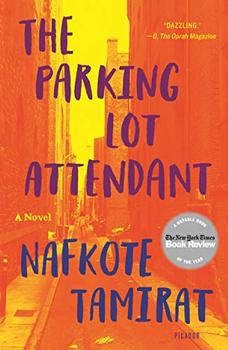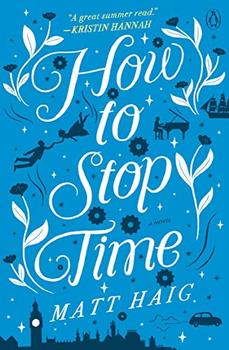Summary | Excerpt | Reading Guide | Reviews | Beyond the book | Read-Alikes | Genres & Themes | Author Bio

Kei Miller is a poet in addition to a novelist, so it's no surprise that his prose is full of beautiful descriptions as well as the enchanting rhythms of Jamaican patois. Miller's Augustown is a fictional valley based on the real August Town, Jamaica, today a suburb of Kingston. The novel opens with an excellent, extended descriptive passage, starting with an aerial view of the island and then moving in closer and closer. "First you must imagine the sky," Miller writes, inviting readers to form a mental picture of the place. "Down there is a dismal little valley on a dismal little island," he continues, an impoverished community of tin-roofed houses and a dry riverbed.
This shabby place has been a natural site for magic since 1920, which is when the historical figure Alexander Bedward, a Jamaican Revivalism preacher, got his reputation as "the flying preacherman." Legend has it that he could levitate, and he prophesied that one day soon he would leave the earth for good and fly up to heaven.
In the novel's present day, 1982, Ma Taffy tells Bedward's story to her six-year-old great-nephew, Kaia McDonald. Ten years ago a "midnight rain of rats" fell through Ma Taffy's roof, taking out one of her eyes and damaging the other. She is a blind seer who knows everything that goes on in Augustown, including the bloody feud between the Angola gang and the rival Babylon boys.
On the day when most of the novel takes place, April 11, 1982, Kaia comes home from school in tears. His teacher, strict Mr. Saint-Josephs, cut off the boy's dreadlocks, saying they make him look like "some dirty little African from the bush." For Ma Taffy and the rest of the community, this incident dredges up memories of the time when a local man named Clarky came back from jail with his dreadlocks shaven and promptly hung himself from a tree. In the Rastafarian belief system (see 'Beyond the Book'), cutting one's hair is forbidden, so to be shaved is a source of great shame. Kaia's punishment leads a horde of angry marchers to approach the school, and provokes the novel's climax, called the "Autoclaps" after a generic term for a disaster in the Jamaican dialect.
The novel moves back and forth in time between the 1920s and 1980s to tell various explanatory stories: why Mr. Saint-Josephs is so angry; how Rev. Bedward, with his messages issued from the pulpit about the lowborn being lifted up – predicted to culminate with his own literal ascension – was seen as a threat by the colonial administration; and how a tough man from the community was in love with Clarky. At times it can be difficult to keep all these tales straight, and the near-constant flashbacks somewhat distract from the main 1982-set narrative.
However, Miller uses these flashbacks to set up an elegant contrast between history and legend. Many sentences begin with "History records…" or "History says…" and convey the somewhat disappointing facts: of what happened to Bedward in the end, for instance – he was arrested, and died in a mental hospital. At times the narrator steps in to overtly discuss the contrast between history and legend, as if to encourage readers to rethink the boundaries between what is plausible and what seems impossible:
Look, this isn't magic realism. … No, you don't get off that easy. This is a story about people as real as you are. … Augustown has become a place that fully expects the extraordinary. …make space in yourself to believe.
Augustown is essentially a collection of the oral and written stories that define a community. That structure is both a positive and a negative: While it introduces a diversity of voices and allows for the interweaving of bits of history and etymology, it can also make the book seem more like a set of disparate tales than a connected storyline, even though Miller keeps circling back to April 11, 1982.
It definitely requires a suspension of disbelief to appreciate what Miller is doing here, but ultimately I took the scenes of flying and levitation – whether literal, or simply a metaphor for rising above unfortunate circumstances – as evidence of the archetypal human desire to escape. The narrator emphasizes this with a profound pair of rhetorical questions near the close of the novel: "What is more human than this, the desire to escape the troubled earth and its depressing gravity? What is more human than the desire to rise above it all, to fly?"
![]() This review was originally published in The BookBrowse Review in May 2017, and has been updated for the
May 2018 edition.
Click here to go to this issue.
This review was originally published in The BookBrowse Review in May 2017, and has been updated for the
May 2018 edition.
Click here to go to this issue.

If you liked Augustown, try these:

by Nafkote Tamirat
Published 2019
A mesmerizing, indelible coming-of-age story about a girl in Boston's tightly-knit Ethiopian community who falls under the spell of a charismatic hustler out to change the world

by Matt Haig
Published 2019
A love story across the ages - and for the ages - about a man lost in time, the woman who could save him, and the lifetimes it can take to learn how to live.
Your guide toexceptional books
BookBrowse seeks out and recommends the best in contemporary fiction and nonfiction—books that not only engage and entertain but also deepen our understanding of ourselves and the world around us.